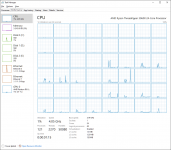I'm always amazed how far the "average" user is behind those of us here.
I mean, sure, your grandparents email and web machine, which is what the true average probably looks like is always going to be far less capable than what we do, but if I didn't know better from years of looking at Steam's hardware survey I would have guessed that people who are into PC games would have better hardware specs.
I transitioned to hexacore in 2010 when I moved from my i7-920 in a cramped and poorly cooled Shuttle SFF case to a Phenom II x6 1090T which I was able to overclock to 4.2Ghz. In 2011 after bulldozer turned out to be a huge disappointment, I moved to the x79 platform and a hexacore i7-3930k.
These days I'm on a 24C/48T Threadripper, but the core count there is only a side effect of me wanting more PCIe lanes than the consumer platforms provided. I would have bought fewer cores if I could, but 24 cores was the minimum on this platform.
I'm generally a proponent of prioritizing per core performance (either higher "IPC" or higher clocks) over more cores. Higher per core performance helps all workloads, adding cores helps only some workloads.
If I weren't forced to 24 cores based on the platform, I would probably have settled for 8 cores today. My work (office/document type stuff) can run well on just about any core count, as long as there are at least two. As far as games go, they appear to take advantage of as many as 6 cores these days, so as long as you don't have too much going on in the background (like streaming nonsense) 6 cores should be fine for games.
I'd go 8 just to give myself a small margin of safety in case that changes before I upgrade again.
But here I am with 24C/48T...


